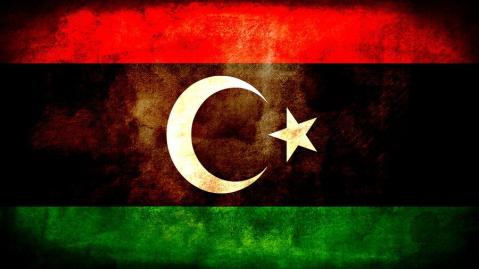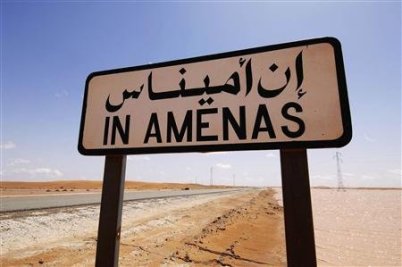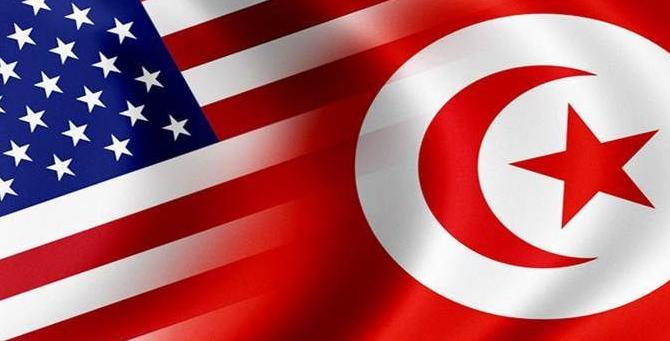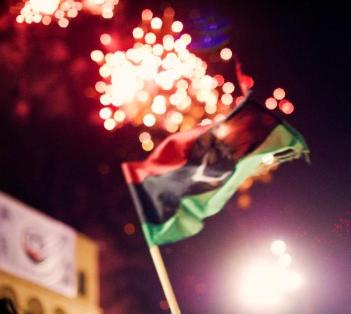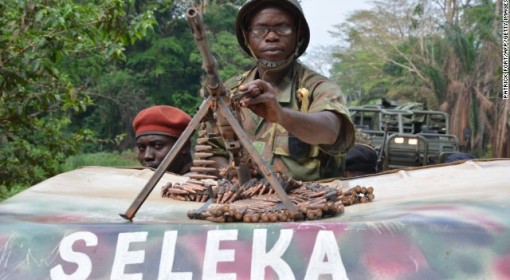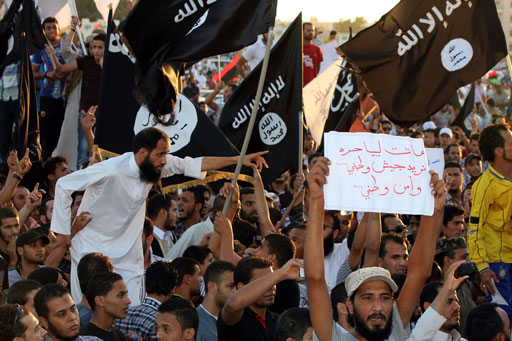There is no overarching theme in Libya – that is, unless you count the effect political paralysis in Tripoli has on the country’s numerous security problems. The longer Prime Minister Ali Zeidan remains isolated, and the General National Congress (GNC) can override his wishes, the longer the Libyan Government will remain unable to brave the endless oil blockades in the East, as well as terrorism, assassinations and intertribal clashes. In fact, the continued political stalemate in Tripoli, as well as the tendency of authorities to divert attention toward the supposed threats of Muammar Gaddafi’s ghost, has only exacerbated these problems.
ONE YEAR AFTER THE IN AMÉNAS SIEGE: ARE THE RIGHT QUESTIONS BEING ASKED IN ALGERIA?
Today Algeria will mark the one-year anniversary of the devastating attack on the Tigantourine gas complex In Aménas, which left sixty-seven people killed, thirty-seven of whom were foreign nationals. This is a sad, but fitting timeline as international energy giants prepare to make a full return to the region. Whilst the day will likely go ahead without much fanfare, sombre reflection is expected among Algerian leaders, who are growing increasingly concerned about their country’s ability to put a stop to the tide of militancy that has swept the region in the wake of the 2011 uprisings. Meanwhile, foreign energy workers are likely to continue to press the government in Algiers for a greater security response, and present some tough inquiries to their Algerian partners. One question, in particular, remains: what, exactly, are Algerian authorities doing to quash fears of another terror attack?
WEST AFRICA FORECAST FOR 2014
This week, I had the privilege of providing interested investors and avid followers of African development with insight and analysis as part of Reuters Trading Africa Forum. Discussions centred on West Africa, one of the world’s most exciting emerging markets. Below were some of the highlights:
SOUTH SUDAN: STARING INTO THE TRIBAL WARFARE ABYSS
All is not well in the world’s youngest country. So far, at least eighty people have been reported killed, including more than one dozen civilians, amid sporadic skirmishes in the streets of the South Sudanese capital, Juba. As death toll numbers continue to spiral, doctors are scrambling to attend to the wounded, most of whom are soldiers. Meanwhile, thousands of innocents have fled their homes seeking refuge in UN compounds, whilst unlucky individuals looking to leave have been faced with the closure of the city’s international airport. These scenes, as chaotic as they are, have been compounded by the frustrations of government officials, who are left struggling to make sense of a situation that had at first been described as a failed “coup”. So what, exactly, caused the calamity in South Sudan? The answer, like the ongoing events themselves, may not be so straightforward.
TUNISIA AND THE IMF: LOANS WITH AMERICAN STRINGS ATTACHED?
Worry over Tunisia’s long-term prospects grew this week, after the International Monetary Fund (IMF) announced on 02 December 2013, that the country would continue to suffer from loan delays, unless it ameliorates both its budget deficit problems and its security situation. The announcement, which came in the form of a statement made by mission chief Amine Mati, also reiterated the concerns of foreign investors, noting that there remains a “wait-and-see” approach to interest in Tunisia.
The IMF has arguably exacerbated the North African nation’s Catch-22 scenario. With dwindling investments, comes a declining economy. As the economy spirals, so too do the jobs numbers. The lack of occupational opportunities, particularly those for young men, has led to a greater attraction toward extremist groups among individuals who feel marginalised and without purpose. This has led to an apparent surge in applicants interested in Ansar al Sharia, an organisation which, aside from being blamed on the 2012 attack on the US mission in Libya, has also been accused of planting hundreds of homemade explosive devices near Mount Chaambi.
This has not stopped the IMF from trying. As recently as 07 June 2013, the international organisation approved a grant of US$1.74 billion, US$150.2 million of which had already been dispersed to Tunisia that same month. The IMF even promised further instalments – security permitting – over the next two years at the enviably low interest rate of 1.08%. Two sweeten the deal, in June 2013 it announced that Tunisia would not have to start paying back the loans until 2018. So why amid this cycle of violence-turned-investor retreat, does the IMF seem so adamant about supporting Tunisia? The answer may be found within the halls of Washington, DC.
LIBYA’S MILITIAS: A GUIDE
This week’s sporadic violence in Benghazi has led international investors to examine whether to place their bets on Libya due to security fears. The truth, however, is that many foreign nationals had already withdrawn their personnel following Tripoli’s mid-November militia battles. The decision to remove foreign staff is attributed to the deeply unpredictable situation that has developed in Libya. To that end, The Inkerman Group has noted the emergence of a delicate militia ecosystem, where some 1700 brigades balance out the power of their rivals, and ultimately, the power of the central authority: the administration of Prime Minister Ali Zeidan and the General National Congress (GNC). This system is borne out of forty-two years of the absolute central command led by deceased dictator, Muammar Gaddafi, who controlled the lives of millions of Libyans. After decades of tyrannical abuse, it is perhaps understandable that Libyans, particularly those Islamists who felt marginalised under Gaddafi, or moderates who fought against the regime in 2011, would be reluctant to step away from their comfort zones – the brigades – and hand over their weapons to the administration of PM Zeidan. Indeed, whether the Libyan leader is Zeidan or Gaddafi matters not. Centrally controlled rule is frightening for many Libyans – a sentiment perhaps most understood by residents in the East who have been calling for more autonomy.
SAVING THE CENTRAL AFRICAN REPUBLIC: THE FORGOTTEN BLOODSHED
What if thousands had perished at the hands of ruthless militias and no one was there to report it? This seems to be the fate of the Central African Republic (CAR), a nation which has already suffered from eight coups since 1960, and is now poised to endure even more bloodshed. Indeed, whilst the international community remains cautious over the apparent success of the UN intervention in the Democratic Republic of the Congo, across the northern border into the CAR, an even more depressing picture has emerged. In a country which consistently ranks among the least reported nations on earth, there haunts the spectre of genocide, as violence between transitional authorities and rebellious factions, combined with a conflict decidedly religious in nature, shows no signs of closure. The situation in the CAR has become so unbearable, that the French Government recently announced it will deploy more of its forces to the restive African nation. This is a considerable turn of events for President François Hollande, who is already facing severe criticism at home and abroad for his military adventures in Africa.
Nonetheless, Paris appears committed to its latest endeavour to ‘save’ one of its former colonies. Following a new UN Security Council resolution on 10 October 2013, the French Government confirmed that, by 2013, it will ramp up its military presence to a total of 1,200 troops. France is not the only international actor attempting to change the heartbreaking CAR storyline. In addition to French logistical support, transitional authorities in Bangui are also counting on military assistance from Burundi and the neighbouring Cameroon. For its part, the UN has also authorised the expansion of its International Support Mission to the Central African Republic (AFISM-CAR) to a total of 3,600 soldiers by spring of 2014. Hopes that an international military response could end hostilities, however, have given away to a heavy dosage of reality, and – as ever – more questions: what is it that ails the Central African Republic? And can it truly be saved?
WILL THERE BE A LASTING PEACE IN THE CONGO?
It may have been the most encouraging news to come out of the Democratic Republic of the Congo (DRC) in recent months, but not all Congolese citizens feel assured. On 05 November 2013, Kinshasa’s most notorious ‘Maï-Maï’ foe, the M23 rebel movement, declared an end to its armed insurgency, claiming it would only use “political means” to achieve its goals. As if to prove its sincerity, the M23 also called upon fellow soldiers, even those who fled across the border into Uganda, to drop their weapons and cease hostilities with the Forces Armées de la République Démocratique du Congo (FARDC) – also known as the Congolese Army. The UN welcomed the statement, saying the defeat would send an “intimidating message” to the dozens of other Maï-Maï – a term Congolese use to refer to militias – operating the region. International leaders also praised the move as a “first step” toward peace, while FARDC soldiers celebrated their victory in the streets. All positive developments aside, one burning question remains: how long will this peace last?
FROM FOOD DRIVES TO FACEBOOK: ANSAR AL SHARIA’S BATTLE FOR THE HEARTS AND MINDS OF LIBYA
Their name may be synonymous with terror – particularly the embassy-attacking kind – but that has not stopped the infamous Ansar al Sharia Brigade from trying to elicit support from the public. Indeed, despite being vilified by the international media, as well as the US, Libyan and Tunisian governments, the Brigade appears to be have unleashed a new marketing campaign, one that shows the ‘softer, cuddlier’ side of the hard-line Islamist organisation. Over the past few weeks Libyans have noticed that Ansar al Sharia, a group widely suspected of orchestrating the 2012 attack on the US Consulate in Benghazi, has stepped up its “volunteering activities” by handing out food and other supplies in the days leading up to, and following, the Islamic holy day of Eid al Adha.
To make sure the public is aware of its good deeds, in early October 2013 Ansar al Sharia circulated videos via social media which showed its members delivering sheep, to be used for slaughter during Eid al Adha, to Cyrenaica’s underprivileged citizens. Not stopping there, images highlighting Ansar al Sharia’s recruitment efforts, which involved the extremist group offering free footballs to those who signed up for the organisation, were also recently published online. These tactics, however, are only the latest in a series of publicity stunts aimed at shoring up domestic support.
THE GAMBIAN BLAME GAME: IS PRESIDENT JAMMEH RUNNING OUT OF SCAPEGOATS?
It was a decision that would bring him comparisons to the likes of Zimbabwe’s President Robert Mugabe; nonetheless, the choice appeared to satisfy Gambia’s own long-reigning leader, President Yahya Jammeh. On 02 October 2013, Jammeh suddenly announced his country’s withdrawal from the Commonwealth, declaring that the West African nation would “never be a member of any neo-colonial institution”. Then came accusations of a foreign coup conspiracy. Just six days after confirming The Gambian departure, President Jammeh released a statement via a state-owned television channel, in which he claimed that both the UK and US had launched “a vigorous smear campaign” against his leadership. For Jammeh, this campaign consisted of “outrageous lies and false allegations”, a game of dirty politics he believed were part of a grand design to remove him from office. What followed next was perhaps predictable. Both the US and UK denied the allegations, whilst the Gambian diaspora have since tried to call attention to the plight of their fellow citizens from abroad. Jammeh, meanwhile, has chosen to stand by his convictions that he is coming under fire from foreign interests which would like nothing more than to unseat an authoritative African leader in order to achieve their unspecified neoliberal agenda. The President’s defiance perhaps begs the question: what are his motives?
Whilst the nature of Jammeh’s personal ambitions may be impossible to confirm, the evidence suggests that the President could be trying to deflect domestic criticism in order to maintain his fledgling grip on power. Indeed, President Jammeh’s history of human rights abuses, combined with his questionable foreign policy, could be the real catalyst for his undoing – and not, as he claims, the conspiratorial goals of Western powers.
